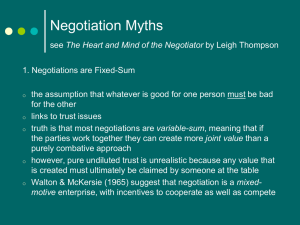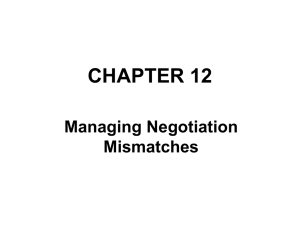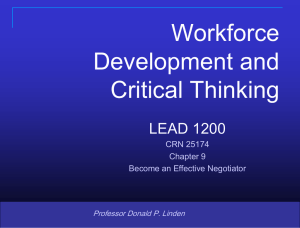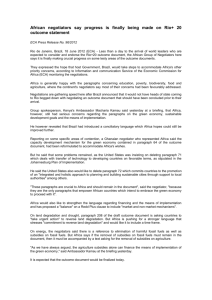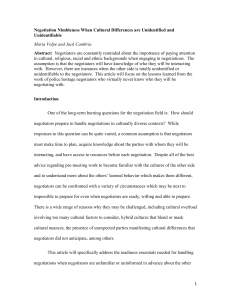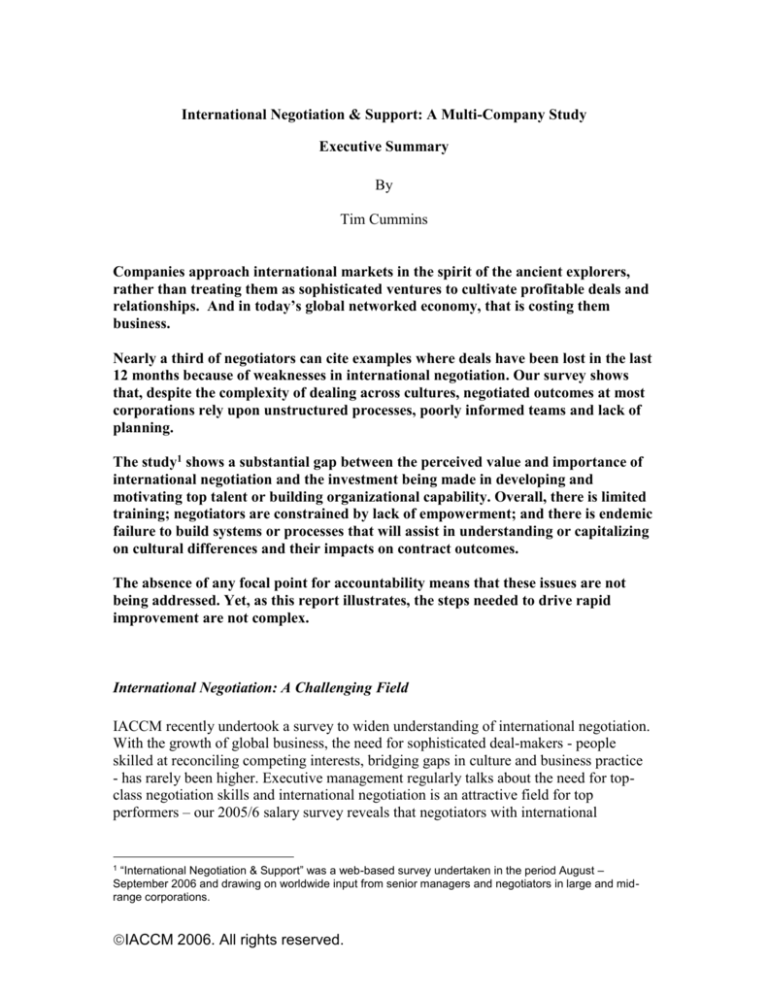
International Negotiation & Support: A Multi-Company Study
Executive Summary
By
Tim Cummins
Companies approach international markets in the spirit of the ancient explorers,
rather than treating them as sophisticated ventures to cultivate profitable deals and
relationships. And in today’s global networked economy, that is costing them
business.
Nearly a third of negotiators can cite examples where deals have been lost in the last
12 months because of weaknesses in international negotiation. Our survey shows
that, despite the complexity of dealing across cultures, negotiated outcomes at most
corporations rely upon unstructured processes, poorly informed teams and lack of
planning.
The study1 shows a substantial gap between the perceived value and importance of
international negotiation and the investment being made in developing and
motivating top talent or building organizational capability. Overall, there is limited
training; negotiators are constrained by lack of empowerment; and there is endemic
failure to build systems or processes that will assist in understanding or capitalizing
on cultural differences and their impacts on contract outcomes.
The absence of any focal point for accountability means that these issues are not
being addressed. Yet, as this report illustrates, the steps needed to drive rapid
improvement are not complex.
International Negotiation: A Challenging Field
IACCM recently undertook a survey to widen understanding of international negotiation.
With the growth of global business, the need for sophisticated deal-makers - people
skilled at reconciling competing interests, bridging gaps in culture and business practice
- has rarely been higher. Executive management regularly talks about the need for topclass negotiation skills and international negotiation is an attractive field for top
performers – our 2005/6 salary survey reveals that negotiators with international
“International Negotiation & Support” was a web-based survey undertaken in the period August –
September 2006 and drawing on worldwide input from senior managers and negotiators in large and midrange corporations.
1
IACCM 2006. All rights reserved.
responsibility typically earn a premium of 15 – 20% relative to their domesticallyfocused colleagues.
But our study revealed that most international negotiators do not feel their work is held in
high esteem. Is this because there is a gap between management statements and on-theground reality, or might it be that those within contracts, legal, sourcing or commercial
groups are not generally performing as top-quality players?
Our study drew input from several hundred international negotiators representing 94
corporations (of which 50 have annual revenues exceeding $5bn). The participants came
from 26 countries and 14 industries.
A Good Place To Be?
We found that just 28% feel that the role of negotiators is held in high esteem by their
organization, not far ahead of the 16% who feel that it is a role of low esteem. And
supporting this question mark over status, 52% feel that lack of personal empowerment is
limiting their effectiveness (against just 12% who feel adequately empowered).2
Compounding this picture is the lack of investment in development and training. Nearly
70% have acquired their knowledge through experience and self-teaching, with just 27%
of corporations offering any form of training on international negotiation or cultural
understanding.
This lack of training is interesting, since 93% of respondents believe that international
negotiation requires specific and sophisticated skills and knowledge and 63% feel that
their organization understands this. But in the end, the picture of the typical international
contract negotiator is roughly as follows:
More than 10 years of negotiation experience
Competence predominantly achieved through on-the-ground experience
Conducting an average of 7 - 9 international negotiations each year
Most likely male (ratio 4:1)
Highly dependent on tactical capabilities – planning, preparation and research are
the exception
There are significant geographic and national variations in the findings. For example,
Procurement negotiators feel more constrained and less valued than their colleagues in
Sales Contracting. US negotiators interestingly feel they are held in higher esteem, but do
not feel as strongly that there are major skill and knowledge differences between
2
The survey revealed significant geographic and functional variations. For example, in the US, 40% feel
they lack empowerment and 19% feel adequately empowered, while in the UK 60% wish for more
empowerment and just 8% feel they have enough. Sales contracting and Legal are substantially more
satisfied on this issue than those in Procurement (34% versus 9%).
IACCM 2006. All rights reserved.
domestic and international negotiation. UK negotiators rate highest when it comes to
esteem, but among the lowest for their level of empowerment.
Our colleagues in Germany are among the least satisfied. They do not consider the role
carries significant esteem (72%); they feel a major lack of empowerment (86%). Of all
groups, they are the most likely to have been offered international negotiation and
cultural training (63%), but they feel it was ineffective (80%).
Planning – What Planning?
Given the perception that international negotiations are complex and require specialist
knowledge, it is perhaps surprising that planning is not the norm. Respondents revealed a
lack of resources and methods – for example, just 10% have ‘robust methods and sources
to research the country / culture before negotiation’. Just 15% take active steps to
consider potential cultural differences before a negotiation. And a scarcely measurable
1% typically take the trouble to research the individuals they will be dealing with to
provide negotiators with an accurate profile.
Do You Have Pre-Negotiation Meetings At Which Potential
Cultural Hurdles Are Reviewed?
40
30
Always
Sometimes
20
10
Rarely
Never
0
It is common for business people to discuss cultural variation sand the impact these have
upon the success of contracts and relationships. As an example, many negotiators
recognize the potential importance of status and issues such as ‘loss of face’. Given all
the stories, one might expect real sensitivity to these issues – yet 91% of negotiators
frequently enter the room (or the electronic forum) without knowing who has authority
on the other side.
We thought that perhaps local or external experts made up for the gaps in central
planning, but this does not seem typically to be the case. 64% rarely or never use
resources ‘on the ground’ and 80% of organizations do not use or have access to cultural
experts.
But Do We Achieve Good Results?
In view of these findings, it is not surprising that 59% of participants feel that “in the last
12 months, lack of cultural knowledge has been detrimental to one or more negotiations”.
IACCM 2006. All rights reserved.
# of times in the last 12 months where lack
of cultural knowledge has been detrimental
to negotiation
Indeed, over 30% directly attribute this as a cause of at least one failed negotiation in the
last year.
At this time, we have no quantitative
data to describe the cost to business of
these short-comings. However, it is
worth remembering that the survey
respondents represent some of the
largest and most sophisticated
corporations, with many years of
international trading experience. We also
know (from previous studies) that these
negotiators typically handle deals worth at
least $5m in value; so if 31% have
personally experienced lost business in
the last year, this represents a remarkable
failure in corporate performance.
Why would companies make so little investment? In part, this is simply an extension of
the general weaknesses we find with business-to-business negotiation – companies
behave as if good negotiators are born, not made. There is typically little investment in
providing a coherent infrastructure of methods or tools to ensure that proven processes
and practices are embedded, or that institutional knowledge is shared. So while
management recognizes that international negotiation is harder and more demanding, the
fix is to apply more seasoned people.
A further factor could be simple arrogance. As Western companies expand into new
markets, they assume their superiority and power. When we look at the responses that
came from employees of Western multi-nationals, 58% consider themselves somewhat
advantaged in negotiation, relative to negotiators from other cultures. This rises to 69% in
the case of US corporations. Just 6% think they are sometimes disadvantaged. With this
belief, which is probably reflected throughout the corporation, why spend time on
training or planning?
Is There Really Any Difference?
The survey also explored the degree of difficulty negotiators experience in dealing crossculturally. Our sample has wide experience across all the major geographic areas, ranging
from 67% that have had frequent dealings with US negotiators to a low of 14% that work
extensively in Latin America. The table below shows a ‘degree of difference’ that
negotiators experience when dealing with counter-parts from other cultures.
Country or Cultural
Group
United States
Little Difference
Substantial Difference
52%
24%
IACCM 2006. All rights reserved.
South America
French
Germanic
Latin-European
E European / Russian
Scandinavian
China / Sino-based
Japan
India
Middle East
Africa
United Kingdom
14%
24%
41%
18%
11%
42%
2%
5%
10%
9%
15%
59%
52%
40%
24%
36%
64%
24%
85%
80%
69%
70%
56%
16%
There are clearly many factors influencing these perceptions of difference and difficulty.
For example, beyond pure cultural style there are the questions of language, legal and tax
systems, business values and social norms. The countries that record ‘little difference’ are
those where perhaps English is generally more readily accepted as the basis for
international communication; where underlying legal and ethical principles are believed
to be most predictable and where there is a strong history of international trade.
Follow-up conversations suggest that non-Anglo negotiators are influenced by the degree
of frequency with which they deal with companies from the US, UK, Australia etc. So in
answering, they are affected by their familiarity with, and the predictability of the
approaches that are taken, rather than suggesting there are few differences.
It is often the issue of unpredictability that makes negotiators most uncomfortable. Crosscultural dealings frequently result in missed or misread signals. This is compounded by
dramatic variations in communication and emotional style, together with many
opportunities for complete misunderstanding. The results suggest that this in fact places
the Anglo negotiator at some disadvantage. Their actions and values are generally better
understood by the other side.
So perhaps that perception of being ‘advantaged’ is misplaced and maybe international
negotiators need to push for greater investment in creating a true competency, rather than
relying on talented individuals.
Conclusion
This study scratches the surface of a highly complex issue. Our networked world is
rapidly driving increased volume of international trade and the ability to negotiate and
manage across boundaries – internal, external, geographic and cultural – has taken on
heightened importance. For the best performers, it is without question a potential source
of competitive advantage.
IACCM 2006. All rights reserved.
There are therefore few excuses for the weaknesses revealed by this survey. While it
would be easy to blame executive management, the truth is that they have no qualitative
or quantitative data to see the need for – or benefits that might accrue from –
improvement.
The steps needed to drive substantial improvement are not especially complex or costly.
Most large corporations have the ability to generate the required insights from their own
multi-national staff. They have access to networked technologies and could easily afford
structured training and more consistent methodologies. They can pursue re-engineering
projects that drive a global base of standard terms and agreements which offer a platform
for increased empowerment.
But as with so many aspects of business performance, a lack of data means that executive
management is not even aware of the pressing need for action. They rely upon staff
groups to act responsibly, to assume leadership and accountability for change.
Armed with the results of this survey, there is no reason why negotiators cannot now alert
their executives to the opportunity in front of them and to push for the investments that
will raise their status and performance.
If you would like to discuss this article, or to copy or reproduce in whole or in part,
please contact info@iaccm.com.
IACCM 2006. All rights reserved.

